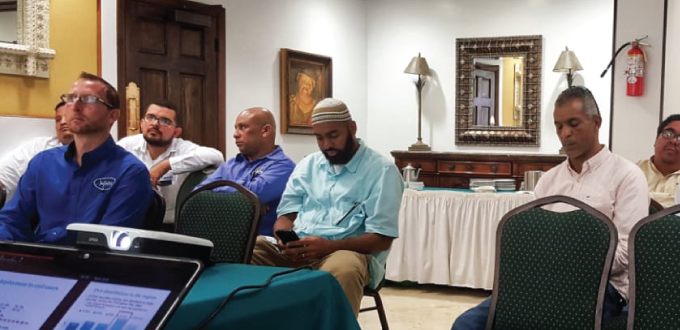LACNIC Takes IPv6 to Decision-Makers in Belize
20/09/2018

Operators, decision-makers at public and private institutions, and the ICT authorities of Belize expressed their agreement with LACNIC’s proposal for IPv6 deployment and promotion presented during the meetings held with LACNIC CEO Oscar Robles and Kevon Swift, head of strategic relations and integration.
The visit to Belize was part of the RIR’s tour of Latin America and the Caribbean and its goal was to accelerate the plans for IPv6 deployment in the country. Both Robles and Swift held meetings with influential ICT professionals in Belize to advise the local community regarding the strategic relevance of an effective deployment of the IPv6 protocol.

In his meetings with government officials and telecommunication company and Internet service provider executives, Robles emphasized four main reasons to deploy IPv6.
The first of these reasons is the traceability of resources using IPv6 technology. In this sense, Robles noted that the idea is to ensure traceability with the possibility of mapping each device with an IPv6 address. This reduces potential mass surveillance plans, increases respect for privacy, and allows effectively prosecuting cybercriminals and hackers.
The second argument made by LACNIC’s executive director is that IPv4 addresses are now exhausted. Today, there are barely 3 million addresses available for 300 million people not yet connected to the Internet in Latin America and the Caribbean so, if the digital divide is to be bridged, one must necessarily resort to IPv6.
The third argument has to do with the development of the Internet of Things, Smart Cities, and plans for Industry 4.0. Any initiative a State decides to promote in that direction will require IPv6. Opportunities to boost industrial sectors will depend on IPv6, as will improvements in traffic management or energy-efficiency through the use of ICTs.
Finally, Robles observed that a country’s delay in deploying IPv6 leaves the door open to receiving large numbers of obsolete devices or devices with a limited lifespan, which would turn the country into a dump site for electronic waste. By promoting IPv6 deployment, it is possible to reduce the introduction of obsolete devices, particularly network devices, which is why governments and public policy makers should strive for guidelines for IPv6-capable devices, solutions and projects.
In turn, Swift commented that he had encountered great levels of IPv6 awareness among the Belizean community. The meetings with government officials served to reinforce the idea of cooperation instead of regulation when deploying IPv6, mentioning the IPv6 alliance in Argentina as a model worth imitating. Likewise, special emphasis was placed on using IPv6 in government plans for the digitalization of public services, as this creates a demand for IPv6-ready solutions.
The tour included meetings with senior officials of Belize’s telecommunications regulator; the minister for ICTs; the Central Information Technology Office (CITO) of Belize, responsible for the country’s e-government and public sector digitization initiatives; the association of ICT professionals in Belize; members of the Belize Internet Exchange Point (BIXP); and several large, strategic members of LACNIC, including Belize Telemedia Ltd (BTL), Smart Networks/Speed Net, Centaur Cable, and Alternative Networks.